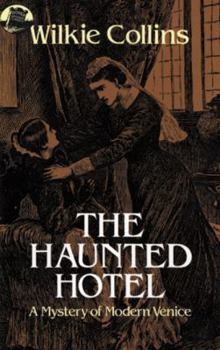The Haunted Hotel
Select Format
Select Condition 
Book Overview
He noiselessly led the way into the hall, followed by the servant on tip-toe. Did the lady in the consulting-room suspect him? or did Thomas's shoes creak, and was her sense of hearing unusually keen?... This description may be from another edition of this product.
Format:Paperback
Language:English
ISBN:0486243338
ISBN13:9780486243337
Release Date:November 2011
Publisher:Dover Publications
Length:144 Pages
Weight:0.48 lbs.
Dimensions:0.4" x 5.4" x 8.6"
Customer Reviews
5 ratings
Subtitled: A Mystery of Modern Venice - 1860 vintage
Published by Thriftbooks.com User , 20 years ago
Reading a novel by Wilkie Collins requires substantial time, but my investment is usually well rewarded. His lesser known novel, The Haunted Hotel, is uncharacteristically short, and is an easy way to become acquainted with Wilkie Collins. The Haunted Hotel offers a fast moving, tight plot that maintains the reader's interest. It is a mystery story, a ghost story, and an early psychological thriller, all melded smoothly together. The story begins in London, but later moves to the modern Venice of 1860. The dark, wet waterways and aging palaces provide an ideal setting for a mysterious death and a possibly related disappearance. Suspicion there is, but evidence is sparse. A threatening apparition indirectly hints at further clues. The psychology component revolves around the Countess Narona, one of the most memorable characters created by Collins. The seemingly amoral Countess foresees, or believes she foresees, her eventual punishment and doom for previous evils. Her obsession leads her step by step toward the very retribution that she hopes to avoid. The Haunted Hotel - A Mystery of Modern Venice was first published in 1879. I recommend buying the inexpensive Dover edition (ISBN 0486243338). Dover also reprints other books by Wilkie Collins, including The Moonstone, The Lady in White, The Dead Secret, Basil, No Name, and others. Through these works Wilkie Collins is credited with having popularized the classic detective mystery story.
...
Published by Thriftbooks.com User , 22 years ago
...This little volume contains enough suspense, fog, and familial twists-and-turns to satisfy any modern mystery fan (if one overlooks the inherent sexism that dates this book)...not to mention the delicious sense of voyeurism in peeking in on this group of gentle Englishfolk. Read it and remember when mystery writers could actually write.
True Collins Style.
Published by Thriftbooks.com User , 24 years ago
If you are a Wilkie Collins fan, well then, add this title to your list. I have. A story filled with suspenses and mystery. It keeps you turning the pages until the end. Who killed the count or did anyone? What happened to the courier? Is the countess mad? Told partly by letters and differing characters' perspective it is typical of Collins' narrative style. He takes the readers to a most stupendous climax in Venice. It is a ghost story, a fun read, like watching an old black and white movie. Recommeded!
Near unique blend of detective story and ghost story
Published by Thriftbooks.com User , 25 years ago
The book's real strength lies in the character of the villainess/ victim Countess. As in Armadale, Collins creates a female character capable of enormous evil,and at the same time so riddled with guilt,and so seemingly trapped by her destiny, that we feel a horrified sympathy for her from the off.None of the rest of the book's characters really come up to the same level, but the plotting as always is excellent, and the variation on the 'substitution' device in 'Woman' marks another first in crime fiction, which has been ripped off ad infinitum. The ending is truly chilling; if the hero(s) and heroine had had a bit more blood in them, this would rank with the very best.
A supernatural, melodramatic mystery
Published by Thriftbooks.com User , 26 years ago
Wilkie Collins, who wrote such landmark (and lengthy) mysteries as "The Moonstone" and "The Woman in White," has a very short effort, too. "The Haunted Hotel" is that effort. As mysteries go, this one is rather understated, though one must make allowances for the fact that it was written in 1878, long before Christie, Carr, and others gave the genre a more definite shape. (One must also make allowances for the sexism contained in the book lest one hurl the book at the nearest wall, window, or other suitable repository.)The story begins when a man and woman become engaged. Sadly, though, he was already engaged. His first fiancee very graciously bows out, and the man marries his second fiancee. They head to Venice, where their stay in a castle is marked by mystery. A maid quits. A porter then disappears without a trace. Finally, the man dies. All of these events lead toward a series of coincidences that draws the many characters together for a final revelation.The story, though, is more a melodrama than a mystery. Indeed, the mystery is subverted for much of the story as the characters' lives overlap, collide, and generally run into each other. It is easy, amid this seeming chaos, to lose sight of the second fiancee, a fascinating character who is so dominated by her sense of fate and supernatural vengeance that she causes events for which she later blames Fate. Unfortunately, she is the most interesting character and is absent from too much of the story. She alone seems to break free of the rather confining roles imposed on the others by the times and the culture. In a longer book, her absences might be a source of great consternation, but the reader who pushes through the first 80 or so pages will be well rewarded in the last 50, where she reclaims center stage and where the mystery also comes to the fore.






